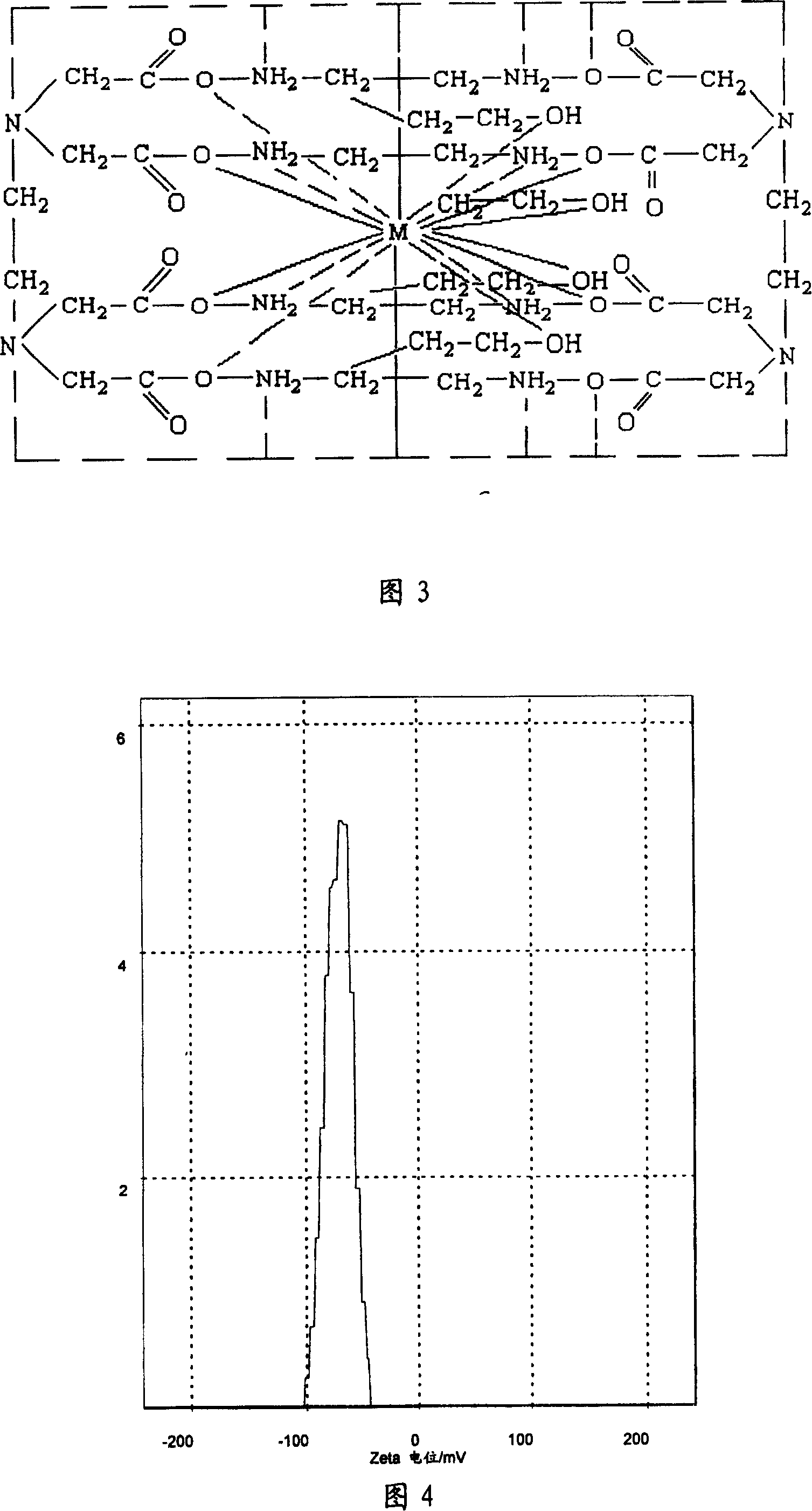Method for purifying Nano silica sol dedicated for super large scale integration
A large-scale integrated circuit, nano-silica sol technology, applied in chemical instruments and methods, silicon compounds, inorganic chemistry, etc., can solve the problems of slow change of pH value on the surface of colloidal particles, poor purification effect, thickening of hydration film, etc. , to achieve significant purification effect, long service life, and the effect of reducing the content
- Summary
- Abstract
- Description
- Claims
- Application Information
AI Technical Summary
Problems solved by technology
Method used
Image
Examples
Embodiment 1
[0031] Inject 1752ml, 3% hydrochloric acid solution into an ion exchange column equipped with 800ml Nankai brand 001×7 type cation exchange resin and stir. After stirring for 3 minutes, let it stand for stratification, remove the upper layer solution, and rinse the remaining cations with deionized water. Exchange the resin until its pH value is between 2-2.5 to obtain an acidic cation exchange resin.
[0032] Then the concentration is 30%, the particle diameter is 22nm, the alkaline silica sol 536g that metal ion content is higher than 100ppm joins in the above-mentioned acidic cation exchange resin of 400ml under the situation of continuous stirring, exchange 15min under the situation of stirring, measure simultaneously Exchange the Zeta potential of the solution so that its absolute value is above 30mv, then stop stirring, leave to stand for stratification, and discharge to obtain acidic silica sol.
[0033] Then get 834ml, 3% sodium hydroxide solution and inject in the ion ...
Embodiment 2
[0038] Inject 2102.2ml, 5% hydrochloric acid solution into an ion exchange column equipped with 1600ml American Amberjet 1200Na cation exchange resin for stirring. After stirring for 5 minutes, let it stand for stratification, remove the upper layer solution, and rinse the remaining cation exchange resin with deionized water. Resin until its pH value is between 2.5-3 to obtain acidic cation exchange resin.
[0039] Then the concentration is 32%, the particle diameter is 47nm, the alkaline silica sol 536g that metal ion content is higher than 100ppm joins in the above-mentioned acidic cation exchange resin of 800ml under the situation of continuous stirring, exchange 30min under the situation of stirring, measure simultaneously Exchange the Zeta potential of the solution so that its absolute value is above 40mv, then stop stirring, leave to stand for stratification, and discharge to obtain acidic silica sol.
[0040] Then get 1000ml, 5% sodium hydroxide solution and inject in t...
Embodiment 3
[0044] Inject 1325ml, 10% hydrochloric acid solution into an ion exchange column equipped with 2000ml German Lewatit-100 cation exchange resin for stirring. After stirring for 10 minutes, let it stand for stratification, remove the upper layer solution, and rinse the remaining cation exchange resin with deionized water. Resin until its pH value is between 3-3.5 to obtain acidic cation exchange resin.
[0045] Then the concentration is 42%, the particle diameter is 60nm, the alkaline silica sol 536g that metal ion content is higher than 100ppm joins in the above-mentioned acidic cation exchange resin of 1000ml under the situation of continuous stirring, exchange 60min under the situation of stirring, measure simultaneously Exchange the Zeta potential of the solution so that its absolute value is above 60mV, then stop stirring, leave to stand for stratification, and discharge to obtain acidic silica sol.
[0046] Then get 625ml, 10% sodium hydroxide solution and inject in the io...
PUM
| Property | Measurement | Unit |
|---|---|---|
| particle diameter | aaaaa | aaaaa |
| particle diameter | aaaaa | aaaaa |
| particle diameter | aaaaa | aaaaa |
Abstract
Description
Claims
Application Information
 Login to View More
Login to View More - R&D
- Intellectual Property
- Life Sciences
- Materials
- Tech Scout
- Unparalleled Data Quality
- Higher Quality Content
- 60% Fewer Hallucinations
Browse by: Latest US Patents, China's latest patents, Technical Efficacy Thesaurus, Application Domain, Technology Topic, Popular Technical Reports.
© 2025 PatSnap. All rights reserved.Legal|Privacy policy|Modern Slavery Act Transparency Statement|Sitemap|About US| Contact US: help@patsnap.com


